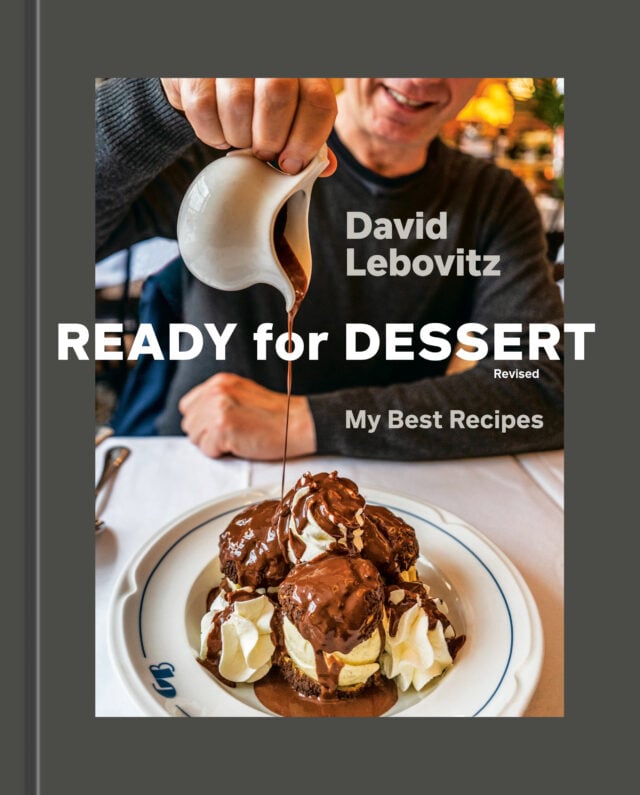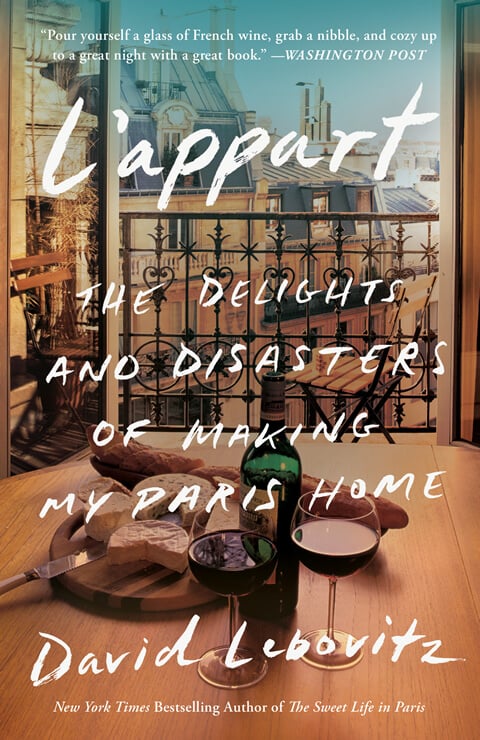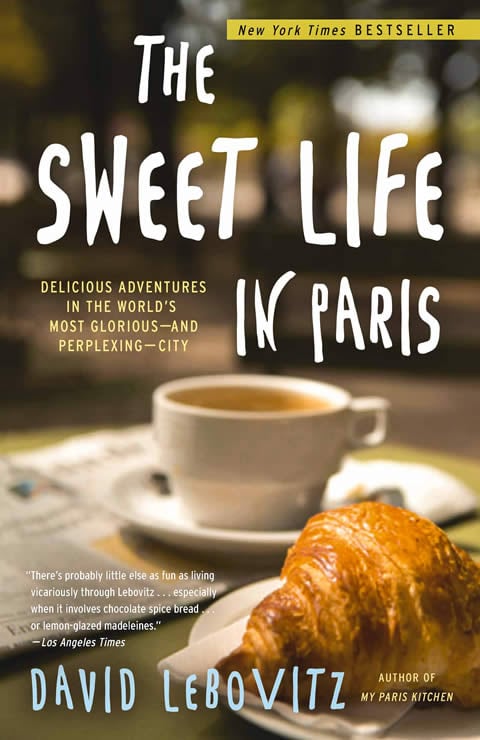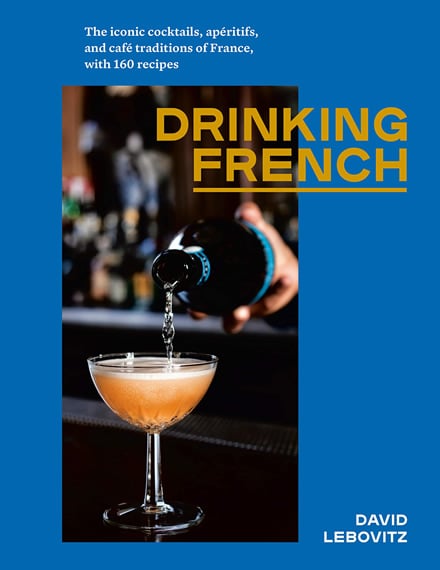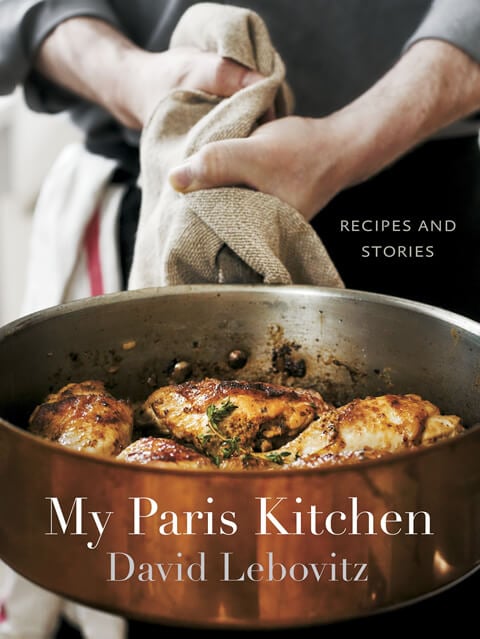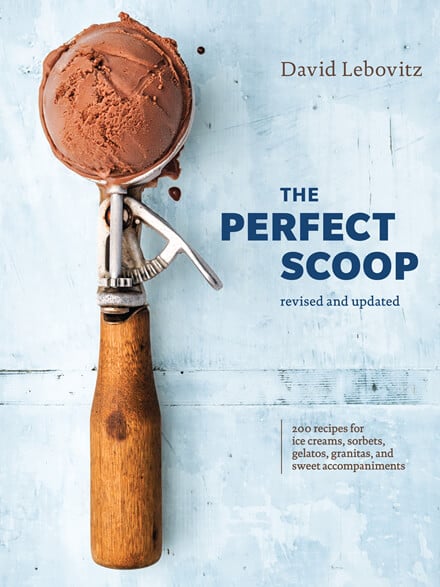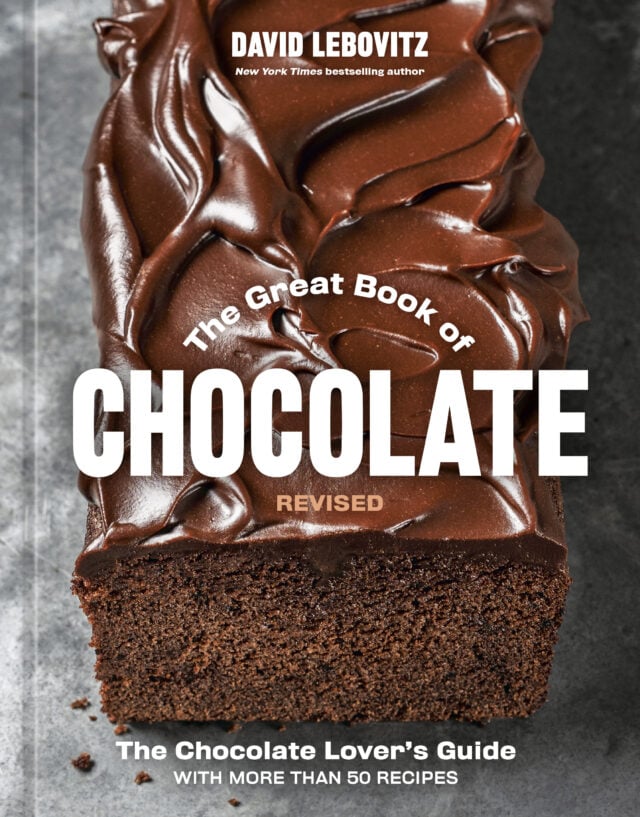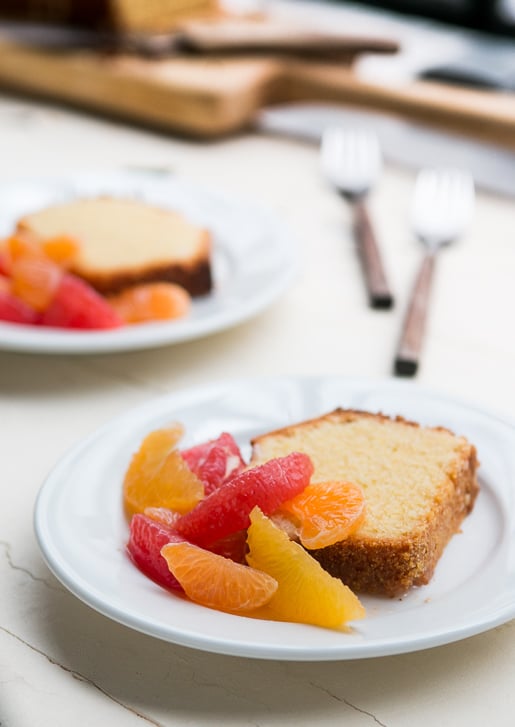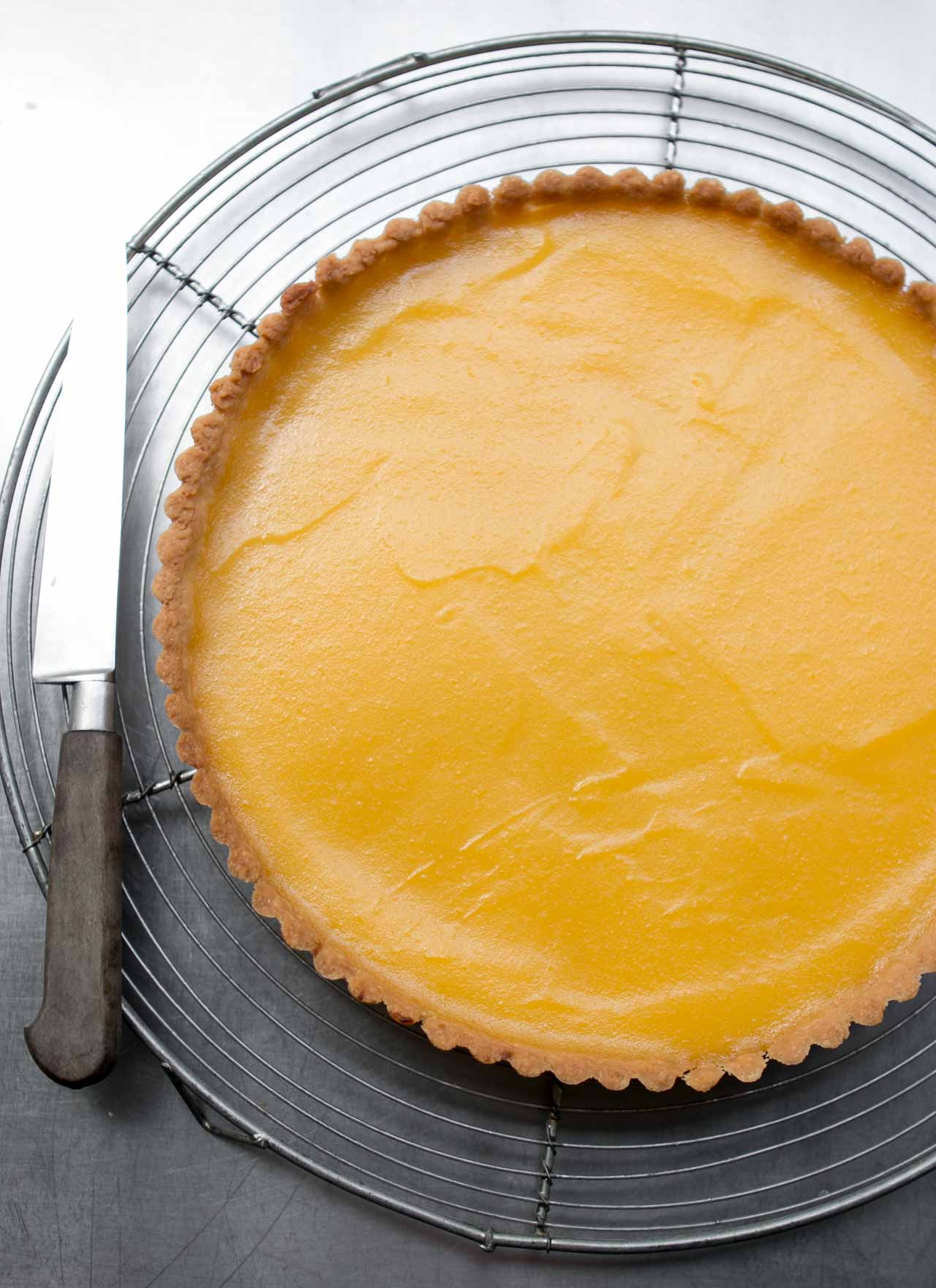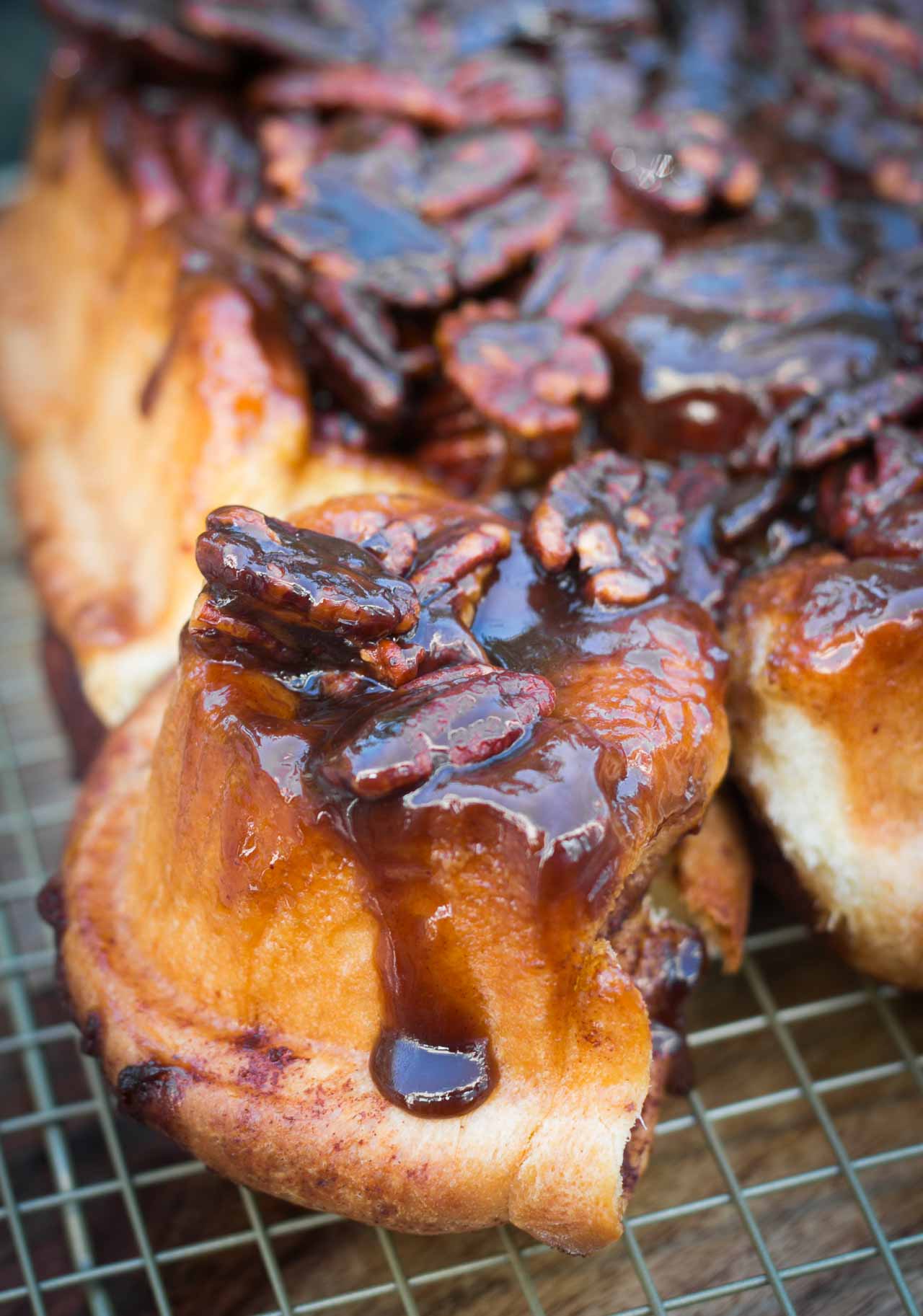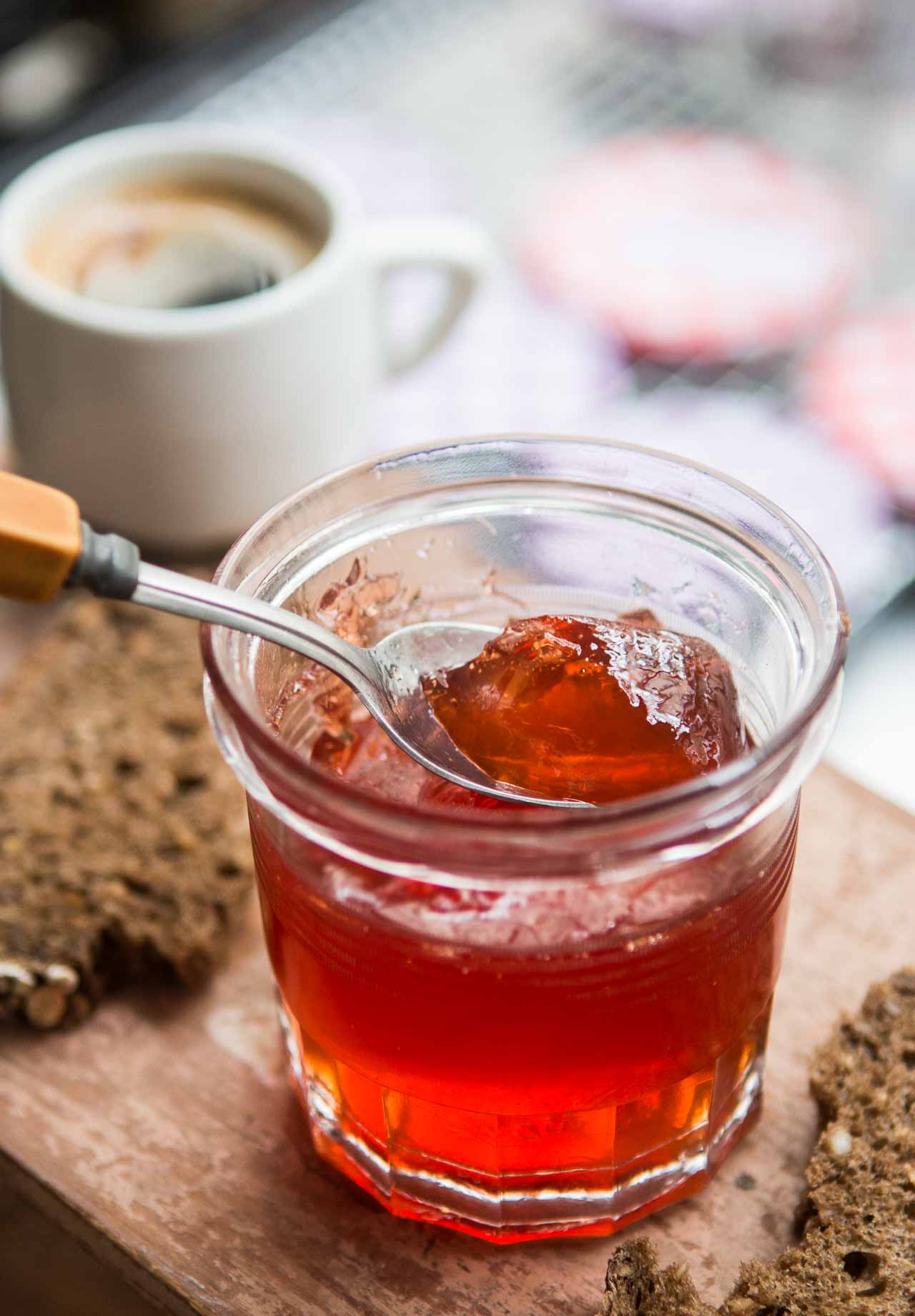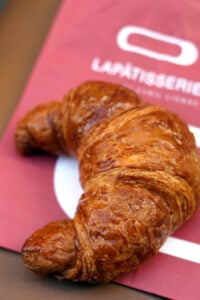Djerba

The sky in North Africa isn’t clear blue. It’s subdued and hazy. One might say it’s laiteuse; blue with a touch of milk, or yogurt. Unlike the beaches of the Pacific, you’re not stunned by the sky as much as you are aware that it’s relentlessly bearing down on you. The heat can be intense and unlike Paris, where folks scramble to sit in any patch of sunshine that they can find even during the unfiltered heat of summer, in Tunisia, one is always fleeing the heat.
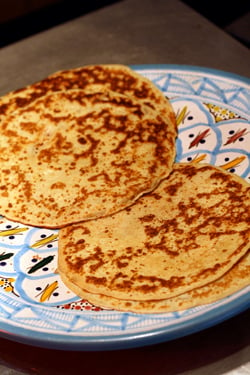

Often that will mean resting in a café sipping a glass of fresh orange juice, or maybe taking a dip in the ocean, or refreshing with a glass of iced wine, all of which I can personally attest to as being equally effective means of beating the heat of Africa.
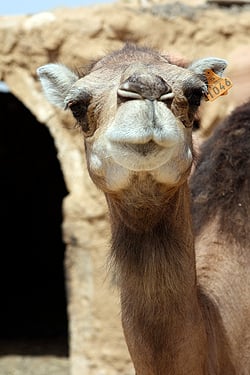

During my visit to Djerba, a Tunisian island just off the North African coast, come afternoon, when the sun bore down fully on the island, I often found places completely desolate.
Shops roll down shutters and people retreat indoors. Or in my case, head to the beach, where I found myself under an umbrella with a good book, often nodding off while the gentle surf provided the soundtrack for a good snooze.
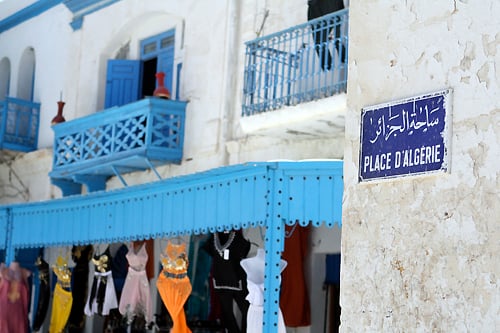
It never occurred to me to go to Tunisia and most of the people I met there were confounded to meet a real American. It’s likely because there aren’t many flights from the states, and Morocco is the country in North Africa that most North Americans land in. I toured Morocco a few years ago, which was fascinating (especially Fez, which I’d love to go back to) but the constant harassing by local touts, affixing themselves to your side the minute you stepped out of your hotel, using every possible means of persuasion to get you to buy something you didn’t want (fake old coins, cheaply dyed carpets, etc), got old quickly.
I remember heading to the airport, strapping myself in to my airplane seat and thinking, finally, no one is going to hassle me anymore.
(I wonder how many more people would actually buy something if they were allowed to shop undisturbed? I know I would have come home with a lot more stuff.)
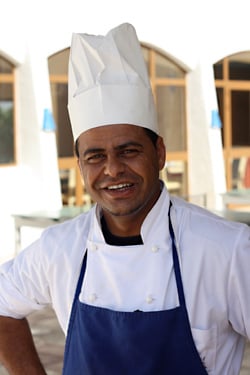

A majority of the visitors to this large island come from France, since Tunisia is French-speaking, and there are plenty of flights that go direct to this beach-friendly île. I also met quite a few Italians who, although I don’t speak their language, try to make themselves understood, as always. It was an interesting mix.
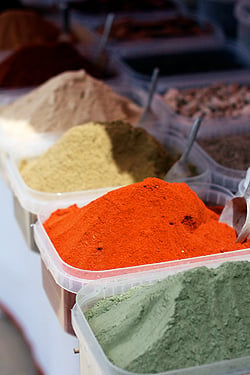
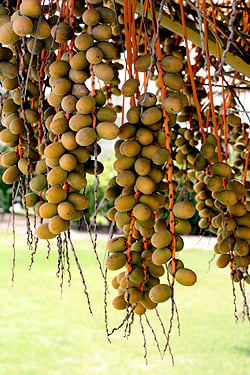
Visiting the local villages, and strolling near the souks you can still get rooked if you’re not careful—one man gave an Oscar-caliber performance when we were at the market, coming over and acting as if he knew us from our hotel, chatting us up like old friends. And then offering to join us for a walk through Houmt Souk, the main city. The ruse often works because a majority of people are trustworthy and when someone says something to you, you tend to believe it. (Or at least I do.) Of course, thirty seconds into our “walk”, I realized he was leading us to some vendor of some sort, where he was sure to get his commission on anything that we bought.
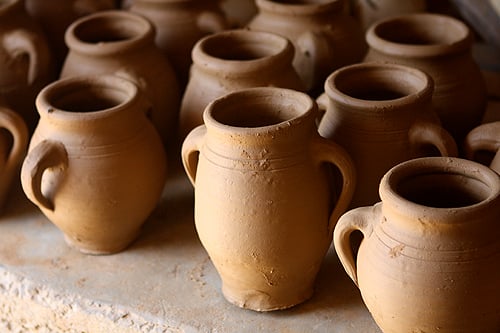
There’s lots of great stuff to buy, but once you even slightly express interest in something, even if your gaze barely lands on something, you’re in for a twenty minute back-and-forth that ends with you trying to figure out how you’re going to fit that clay amphora which the merchant swore he found in his grandparent’s attic and was from a family heirloom from the twelfth century, into the overhead bin.
As we ducked away, I decided that shopping was too stressful, and we decided to enjoy the city from the comfort of café chairs in the shade of the main square.

I’ve learned a few things living in a foreign country and during my travels. One of the most important things is the experiences you can have if you take a moment to befriend the locals. (Except for the ones trying to sell you something, of course.) Asking at the local produce or seafood market for a good restaurant suggestion often yields better advice than hotel clerks, who are likely to steer you to somewhere touristy. I tell visitors to Paris to go to the same café each and every day so they get to know you. Make it your cantine during your stay. Then ask the people who work there where else to go in the neighborhood. It’s a strategy I’ve used over and over, and I’ve rarely been steered wrong.


Luckily for us, we got off to a good start as the cab driver that picked us up at the airport was friendly and honest. Romain has the unusual ability to befriend bus and cab drivers, waiters, and airline agents, and can transform even the most surly person into a friend. It’s a huge help in Paris, let me tell you.
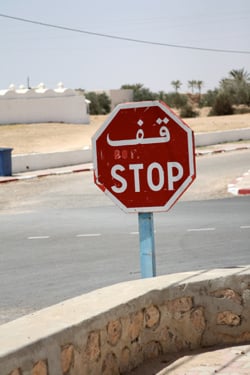
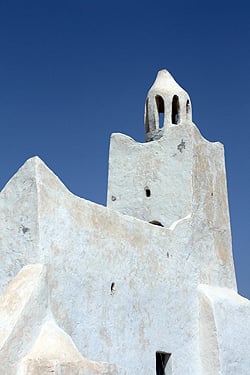
So off we went with Karim (tel 98 573 476) on a loop around the island. We saw some of the sights, like the ancient mosque, one of the estimated three hundred or so on the island. The stone mosque was gorgeous, especially when set against the hazy blue sky, but using the aforementioned strategy, I was anxious to go to the local pastry shop, which Karim recommended as the best on the island.

Obviously Karim wasn’t used to people asking to visit a bakery (obviously he’d never met me…) and the unmarked building that he took us to was the highlight of my trip.
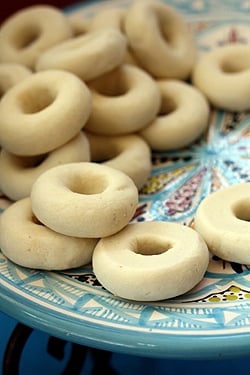

After stepping into the simple white shop with no sign or name and viewing the breathtaking pastries lined up, each one picture-perfect, I asked if it was possible to poke my head into the kitchen next door where they were making the pastries by hand. The saleswomen were shy, a bit timid to even meet my gaze, but Karim stepped in and asked if it was okay. I was pretty sure that they’d not been asked by anyone to go into their workshop before, especially an American with a fancy looking camera, and an appetite for Tunisian pastries.

When we walked in to the tidy kitchen, a grinder was hard at work, spinning and pulverizing toasted almonds into smooth almond paste. The almonds had been roasted just to the point where the edges were burnt; those last few moments of baking encouraging out the maximum almond flavor, no doubt. I resisted to urge to take one of the of almonds cooling on a rack and giving it a taste, to see for myself. The smell of toasted almonds, warm honey, and orange flower water lingered in the slight breeze and added a sweet smell to the workshop.
Each of the four or five tables had one woman presiding over it. The one that really caught my eye was where a woman was rolling out pastry so thin that it would make a sheet of newsprint look a phone book. (Remember those?) Another woman, not meeting our gaze but intent on her work, was hand-cutting triangles of pastry, layered with almonds, honey, and very green pistachios. After making sure with the woman who ran the kitchen that they were fine with me snapping a few shots, I moved nimbly around them, and quickly, because they were working so fast, as I tried to get a few pictures.

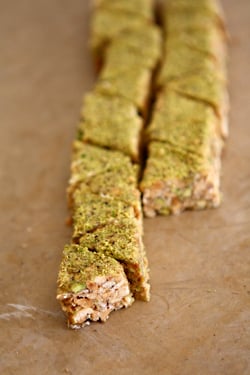
Another tip I advise folks during their travels is to appreciate what you’re seeing, then take a picture. It’s easy to get wrapped up when seeing something incredible and wanting to immediately snap off a few shots. But there’s also something to be said for being present in that time and place. And for respecting what the people are creating, and respecting their privacy. (Whether you’re at the stall of a French butcher or an Italian gelateria.) The shrouded women at this shop I’m sure weren’t entirely comfortable with me in there, although they were nice enough to give me a quick peek at their handiwork, and I made sure to thank them profusely for their kindness and complimenting them on their astoundingly beautiful pastries. Then we went back into the shop and left with a box of pastries we’d purchased.

One thing I’ve learned about traveling is that you should just enjoy what you have right then and there, and not worry about buying more, stocking up, bringing some home, or whatever. Just eat it there. As my friend Susan Loomis says, “You don’t need to own it, just enjoy it.” And I agree.

We did stock up, but just enough to enjoy during the week. We did consider going back and getting more to bring home with us, but decided that we were satiated by what we’d had. And decided to wait until the next trip to go back.
(If you do come to Paris and want to taste exquisite North African pastries, one of the several branches of Bague de Kenza is the place to visit.)


There’s a lot of talk on the internet about whether we, as customers, have the right to take pictures indiscriminately in private establishments, like restaurants and bakeries. And I’m often asked by readers how I feel about that and what I do when I go into a place. My response it that for one thing, we need to be mindful that we’re in a privately owned place, and if they don’t want people taking photos, I don’t take photos.
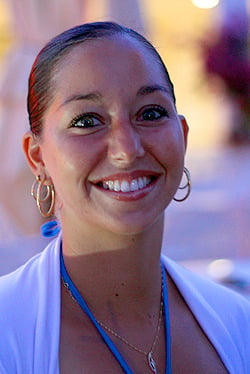
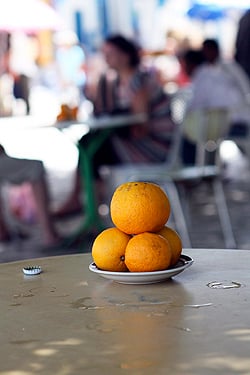
But more importantly, I don’t take out my camera if it’s going to have a negative impact on the experience, especially in less-developed countries where tourism and taking pictures can cause a situation that’s not always favorable. I usually bring a lightweight lens, take my camera out, snap a picture or two, then put it away. I think that’s the best way to get a good shot; when it’s a natural extension of the experience, when you’re not interrupting people’s lives.
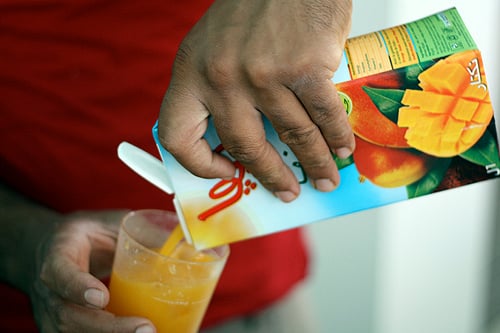
Like other North African countries, most of the cooking in Tunisia is done by women, in homes and in restaurants. And it’s hard to have ‘authentic’ regional cuisine unless you’re invited into someone’s home for a meal. But if you poke around, especially at the local market, you can find some unusual things to sample.


I’d never seen such little-bitty pears anywhere, which were called poires naines, a vague term for “dwarf pears”. Each one was the size of a grape, and they were pretty sweet, albeit a bit crisper than the juicy pears one might be used to. But piled into a big Tunisian pottery bowl, like the many I managed to resist at the market, they certainly were striking.

We stayed as guests of the Djerba La Douce hotel, who were kind enough to take pity of my for having missed my last vacation due to the volcanic eruption.

Upon arrival they told me that the rooms did not have Wi-Fi, and to get on the internet I’d have to sit in the lobby. Of course, I freaked out. Having just got off the plane and dressed in my heavy jeans, shoes and socks, and a jacket, I must’ve growled a bit at the short blond woman at the counter, then wheeled my suitcase off to my room.

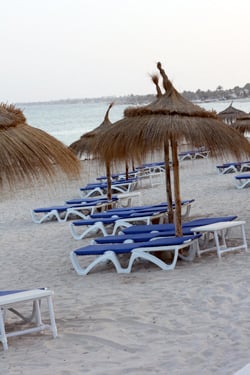
A few days later, dressed in shorts and sandals, recuperating after a long day of making sure my beach towel was in just the right position on the lounge chair, her and I were sipping drinks by the pool, and she said to me, “So—do you still miss your internet access?”

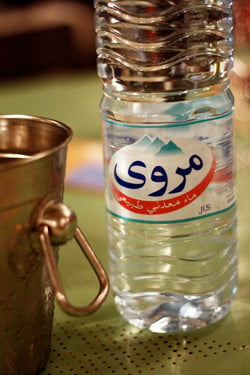
I had to admit it was great just unplugging it all and only checking in once or twice during the trip. I’d managed to truly relax, which is no small feat, and it was funny to see subsequent guests arrive, dressed as I was and looking around nervously, while we dipped our feet in the sea and tried to make them jealous of how limpid we’d become.

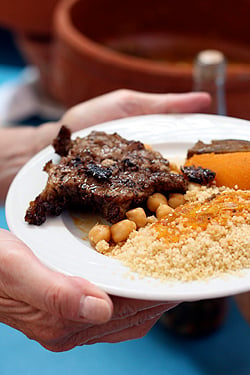
Aside from those pristine Tunisian pastries, I managed to sample some wonderful Tunisian cuisine. One day I woke up and saw a line-up of lambs being roasted on spits, with gray smoke billowing around caused by the cook dumping water on the coals every once in a while, which I presume was to lend a smoky flavor to the spinning mutton.

Of course, I befriended the smiling chef as well (hey, I wanted the best pieces when it was time for lunch), and a little later, the lamb was cut up and served with couscous, Berber harissa (hot sauce), chunky vegetables, and the most amazing brik à la œuf: a spread of very thin dough, like a won-ton wrapper, enclosing a raw egg, then deep-fried. The crispy shell was weightless, and when you cut into it, a soft, just-cooked egg slid out and mingled with the flakes of the golden crust strewn about the plate.

I was shoveling in the food as fast as I could, it was so good. And I was (almost) a little sorry that I had filled up on the extraordinary bread that women were baking on flat metal griddles, which were torn into pieces and dipped in chermoula, a spicy paste made with chiles, garlic, and lemon. But here was a thick dip, made with peppers and tomatoes.


At times I felt explosively full. Aside from not having internet access, I didn’t realize that photo-sharing sites like Flickr are banned in Tunisia. I don’t know how photos could be so subversive, and I felt immediately lucky that I’ve never lived in a country that blocked access to websites.
Along with photo-sharing sites being banned, other things are interdit in Tunisia, too:

This young law-breaker I found combing the beach. And before I could alert the police about this scofflaw and his flat-stomach (when I showed this picture to a woman friend later that night, she starting stroking it on my camera screen and she looked a little teary-eyed), he rode off on the horse he came in on.
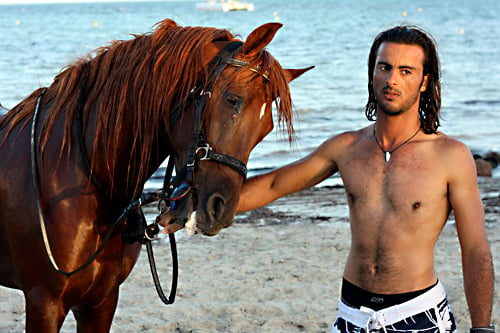
Fortunately these young men also managed to gallop away to safety, although from their frocks, I couldn’t tell if they were sporting those dangerous tablettes de chocolat, as they say in French. I have to say after a winter of being housebound with nothing but a few kilos of chocolate to keep me company, I too have ‘tablets’ filled with chocolate. But of a less-alluring sort, unfortunately.
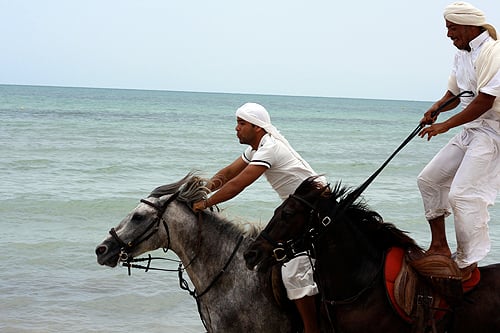
Maybe if I rode around on horses all day?


Instead of hanging out at the bar in the evenings…

Although I had to admit, cocktails weren’t really the order of the day for us because it was so warm. Icy rosé, as usual, was the answer. Someone asked me if the rosé in Tunisia was any good and I’d have to say that yes, it was.

Which was a conclusion that I came to after sampling quite a few glasses. But it really is the perfect summer wine and stands up well to being poured over copious amounts of ice, which dilutes its force. For those who are shocked at putting ice in wine, well, get over it. It’s inexpensive wine, not a grand cru. And everyone was putting cubes in their glasses. Although because most of the other guests around us were French, I think they were just reveling in the generous amounts of ice in the buckets the waiters kindly put on all the tables. Because the dangers of ice cubes are well-documented back home, and only on vacation is one allowed more than one dinky cube of ice in a drink. Let’s not get too crazy, now.

After a week of lazing in the sun, avoiding anything to do with whatever was happening across the Mediterranean, it was time to head back home. I did manage to resist bringing home any souvenirs, although there was no shortage of things lying around to choose from.
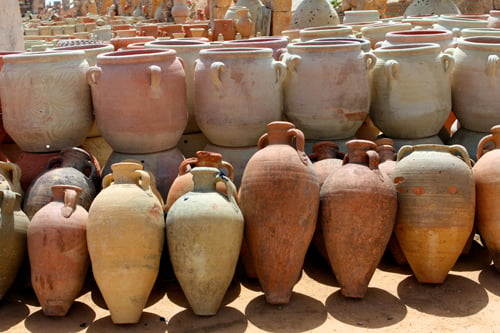
Relate Links and Recipes
North African Pastry Recipes (Melissa Clark)
Tunisian Brik (Jamie Oliver)
Israeli Couscous with Butternut Squash and Preserved Lemons
